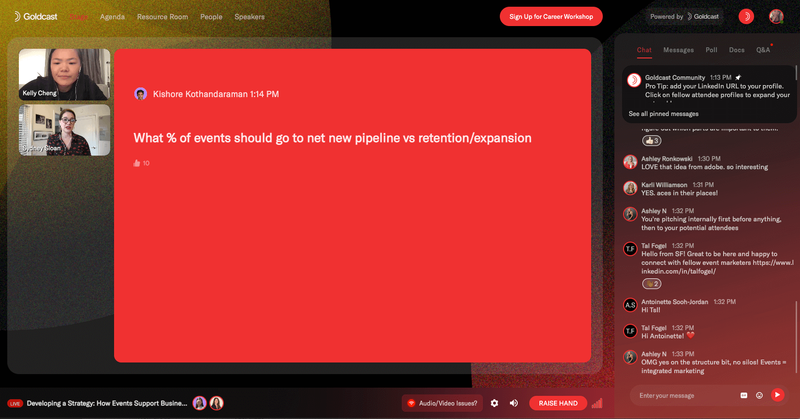Strategic Events: Sydney Sloan on How Events Drive Business Growth

Maximize Your Marketing ROI
Join 10,000 other marketers already getting the best tips on running engaging events that boost pipeline and create raving fans.
Sydney Sloan got her start by writing a business plan for an event planning company while a student at USC. She worked her way up through the industry to Chief Marketing Officer (CMO) at SalesLoft and is now the Executive in Residence at Scale Ventures.
She joined Kelly, Head of Growth at Goldcast, to share her thoughts on how event marketers must be excellent planners and make strategic decisions that help events support business growth.
Enjoy Sydney's session on-demand, and check out our top three takeaways below. ⤵️
Takeaway 1: Events are a key strategic pillar in B2B organizations
Events are where marketing, product, customer success, and pretty much every other team come together. It is critical to have a good strategic plan in place to benefit from their hefty costs in both dollars and people's time. When it all comes together, events are the perfect place to get messages aligned and create or continue an ongoing conversation with the market.
The best place to start is to ensure that you understand the overall business goals. Event marketers are problem solvers, and you should be able to present several options to your CMO or other key players on how you plan to meet business goals. If the goal is to help retention, what are three different ways (with measurable outcomes) to get there?
Event marketers should also partner with the executive sponsor of the event and develop a clear understanding of ideal outcomes. This is part of developing relationships with anyone who impacts event planning, process, and outcomes.
If you don't know who those people are, find out. The executive sponsor of the event is a great place to start. Their knowledge can help you narrow your focus on which other key players to engage.”
You can't be shy or draw a narrow view of your role as an event marketer. Keep in mind that ultimately it is the reaction of and future actions of your current customers or people you can funnel into the pipeline that will determine the success of your event.
Jump in with both feet and immerse yourself in the customer experience, communication, brand, and product. Go to meetings with product teams. Go to trade shows and other events and talk to customers. This is how you can ensure your events tap into what you want people to think, feel, and do.
During events, create a mini-campaign or campaigns to focus on. Are people interacting the way you want? Are they attending the workshops you want them to attend? Marketing is ongoing during events, not just something that happens before or after. Several mini-campaigns can spring organically during events, and all of them should be on the path that goes back to the company's goals and forward to future strategies.
Takeaway 2: Events can (and should) be part of more extensive integrated campaigns
As an event marketer, you should work with a product roadmap to define the theme of an event-led campaign. Determine the rhythm of the business equation and what you want the story to be at your event. Work with the head of product regarding where the product roadmap is going and weave that into your event.
There should be an ongoing theme from this product roadmap that evolves over the year rather than hitting like a lightning strike. You must delve deep into the campaign and break it down into the chapters that led to it, so there is a continuous conversation. You shouldn't be having new conversations with customers every quarter but rather presenting them with the next chapter.
You aren't just putting on one event that affects things on that day or in just the near future. You are weaving together a story that starts with the rhythm of your company and tells people where you've been, where you're going, and why they should come along for the ride.”
Once the event is over, keep using the storyline to fuel your campaigns. Campaign managers should be able to keep following that same road to keep customers and potential customers aware of things like upcoming innovations and where the company ultimately wants to go. One event on one day can inform the strategy for an entire year.

Don't forget the rest of the company when it comes time to engage people and get them excited about your upcoming event. Internal promotion is a crucial strategy for successful event managers. They get teams involved by making them part of the overall strategy. Having buy-in from anyone who can influence the eventual outcomes of your event helps give you solid evidence of success to pass along to the people deciding whether you get to hold another one.
Hold separate meetings with just the Event Leader to help ensure that everything tracks back to the event's goals and what they want to come out of it. Getting the head of sales on board is just as important as engaging the marketing team. Don't just talk to these strategic internal partners. Get them to show up in the room.
When these strategic internal partners are involved, they can work toward their own goals, contributing to the company's goals. The sales team should be able to engage with and potentially close new clients. The marketing team should have the opportunity to talk to existing customers about what messages or campaigns caught their attention. The information these internal partners gather becomes part of the story you are trying to tell and helps guide you toward how to grow the business.
You don't have to throw a party to get all the right people together. If there is someone you think is essential to meeting the event's goals and, ultimately, the business, go talk to them. Collaborate on ideas and make those relationships work for you and your company.
Takeaway 3: Event goals and budgets should ladder up to business goals
You should have a clear picture of how your event goals relate back to overall business goals and be able to ladder them up to integrated campaign goals. If the company worries about retention, your focus should be on existing customers and how the event can persuade them to stay. If it is a product launch, a wider invitation list and events that help people know and understand the product are critical.
Defining types of goals before the budget is considered a crucial part of planning a successful event. But it is no secret that the budget impacts how large those goals can be. They have to go hand in hand.
You have to consider the goals of the marketing team and the company, and it's a dance. It's hard to say that one has to come first because it isn't that simple. At the very least, you must understand the goals, where they each fall in terms of priority, and how you can make the budget work to address them. If you don't understand all the pieces, it will be hard to articulate afterward whether your event was a success.
To show the impact of events, look around and use the metric, "How much money is in the room?" It is easy to say that you got more people registered for your event than anticipated. Still, that metric doesn't necessarily address the ultimate business goals you are trying to influence.
The number of people isn't nearly as significant as the amount of money, which is in both prospects and current customers. If you have 450 accounts in the room that bring $100 of revenue to the company, that is a significant, measurable impact. Those kinds of numbers impact retention and growth, and those are just as important to goals as prospects to close growth.
There are no reports that are going to show this type of impact from an event. You have to be in the room, gauge the money, and use this to present the impact.”
In the post-event readout, showing those big numbers should be the first thing event marketers do. It justifies the budget and informs future event planning and marketing. It also shows that you understand what the company is trying to accomplish and that you see beyond registration numbers to ultimate goals.
The two things that CMOs care the most about are ROI and quality. They have to be able to see this from events, and you have to be in a position to tell the story. This goes back to how important it is to make yourself part of a larger team that helps define themes, determine strategies, and measure outcomes.
At the end of the day, CMOs have to see the value added. Events are one of the bigger items in marketing budgets, and if they don't work, budgets get cut. Work closely with marketing ops. Become buddies with the data and finance teams so they can help you clearly articulate return on investment (ROI), customer acquisition costs (CAC), and revenue projections.
Do this effectively, and it will help you tell the story of your event in a way that encourages future investment in campaigns and events that help your company reach its goals.

Transform Your Video Marketing with AI
Stay In Touch
Platform
Resources
Company
© 2026 Copyright Goldcast, Inc. All rights reserved.
YOUR PRIVACY CHOICES




 Upcoming Events
Upcoming Events Event Series
Event Series On-Demand Events
On-Demand Events

